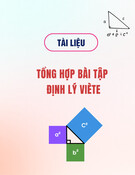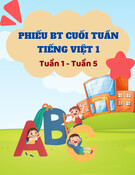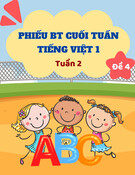LESSON PLAN
Time: Tuesday, February 28th 2017.
Lesson: Unit 10 – Conservation.
Section: A. Reading.
Class: 10A7 and 10A8.
English level: Basic.
Number of Students: 2533.
Time: 90’.
I/ AIMS: By the end of the lesson:
Students will understand the main ideas of the paragraph through vocabulary
about the Conservation.
Students know more the ways conserve and improve the environment of the
animals.
II/ APPROACH AND TEACHING AIDS:
Grammar Translation Method.
Handout, Board, Chalk, Audio, Picture.
III/ ANTICIPATED PROMBLEM:
Technical problems (Teacher must arrive at the classroom early to prepare and set
up the speakers and projector, as well as have the alternative plan in case it malfunctioned. )
Besides the important vocabulary that will be introduced by the teacher, students may not understand the meaning of other new words. (The teacher has to instruct students to guess the meaning of unfamiliar words basing on the context and then explain these words at the end of the lesson).
Students may be tired and unwilling to participate (Teacher must arouse the
interest from the very beginning.
IV/ TEACHING PROCEDURE:
New lesson
TEACHER’S ACTIVITIES STUDENTS’ ACTIVITIES CONTENT
READING 1
WARM UP (7’)
_T welcomes the class:
T gives a game for Ss.
_ Ss complete it, besides that read name of animal.
_ T reads and requests Ss repeat.
+ Rule of the game: _ Teachers gives each group a picture has a different animal, but it was cut out. _ Ss couple of some pictures and complete it in 2 minutes and raise their hand to read the name of animal. _ If the group answer correctly and quickly , will have a point _The winning group they will have a gift.
+ The name of animals: _ Black Rhino /blæk/ /'rainou/: Tê giác đen
θə _ Panther Siberia / / /sai´bi ri ´pæn ə ə : Báo /
Siberi
_Sumatra Tiger /'taig /ə : Hổ Sumatra
ə ə/: Kh ỉ
_Mountain Gorilla / ˈ ʊ ə ma nt n/ /g ´ril ộ đ t núi
ạ _Bactrian camel /´kæml/ : ướ u L c đà 2 b
_ Whale /weil /: Cá voi
PRE READING (15’)
+ Vocabulary of Part A:
_ T introduces the New lesson.
ə ə
_ Find the new words.
T asks Ss to listen and underline new words.
ɔ ə ự ả ồ : S b o t n _T shows new words
ấ
T reads and asks Ss to repeat
Ss reads an individual
T invites Ss to read individual ə ə : ti/
ạ ự T fixes for Ss.
ạ ủ ộ
∫
ố
_ T shows meaning of words. _T requests Ss to take note about 1 minute. _ Write down the new words on the notebook.
ế ệ
ệ ế ấ
ể ị
ệ ế t,bi n m t.
ự ậ ị ộ
1) Conserve (v) /k n's :v/: ả ồ B o t n Conservation (n) /,k ns :'vei n/∫ 2)Loss (n) /l s/ɔ : S ự ỗ m t,thua,l 3) The loss of forest : Vi c ệ phá r ngừ 4) Destroy (v) /di'str i/ɔ : Phá h yủ 5) Variety (n) /v 'rai S đa d ng 6) Plants and animals variety ự ự : S đa d ng c a đ ng th c v t.ậ 7) Species (n) /'spi: i:z:/ gi ng ,loài 8) Eliminate (v) /i'limineit/ = remove /ri'mu:v/, get rid of : ấ Tiêu di t, bi n m t. Elimination (n) /i,limi'nei n/∫ : S tiêu ự di t,bi n m t. Eliminable (adj) /i'limin bl/ə : Có th b tiêu ấ di 9) Species of plants and animals are eliminated : Các loài đ ng th c v t b tiêu di t.ệ
ệ t đáng lo ng i.
ə 'geinst/ :
ệ
ɑ b nh tim
ự ủ S phá h y
10) Especially worrying : ạ ặ Đ c bi ượ ử 11) Be use as : Đ c s ư ụ d ng nh . 12) Against(prep) / ạ ố ch ng l i 13) Cancer (n) /'kæns /ə : ư B nh ung th 14) Heart disease ệ /'h :t/ /di'zi:z/: 15) Medicines (n) /'medisn/: thu cố 16) Sickness (n) /'siknis/ : B nh ệ Sick (adj) /'sik/: B nhệ 17) The true cost of : Cái giá ậ ự ủ th t s c a. 18) Destruct (v) /di´str kt/:ʌ Phá hủy Destruction (n) /dis'tr k n/:∫ʌ Destructive (adj) ʌ /di'str ktiv/ : Phá h y ủ
WHILE – READING (15’)
_ Ss do exercise
_ T gives the task 1 for Ss ( Page 105) Task1/ page 105 : 1c 2a 3d 4b
T checks and corrects their answers.
POST – READING (8’)
_ Ss answer some questions. 1.About 4000 species of
_ T gives some short question for Ss. Ss just answer Yes/ No to check their lesson .
plants and animals are eliminated each year? No 2. Species of plats and animals are eliminated each
year ?. Yes 3. About 5000 species of plants and animals are appeared each year? No 4. Plants and animals could not be use as medicines ? No 5. Plants and animals could be use as medicines against cancer and many other sickness ? Yes.
+ Homework. _ Learn by heart words. _ Prepare paragraph B,C.
READING 2
WARM UP (5’)
TEACHER’S ACTIVITIES STUDENTS’ ACTIVITIES CONTENT
_ Individual.
∫
ố
ạ
∫ _ destroy (v) /di'strɔi/ : phá h y.ủ _ variety (n) /və'raiəti/ : s ự đa d ng.ạ _ species (n) /'spi: i:z:/ :gi ng ,loài. _ eliminate (v) /i'limineit/: ạ ỏ lo i ra, lo i b . _ cancer (n) /'kænsə/ : b nh ệ ung th .ư _ sickness (n) /'siknis/ : ệ b nh. ố
ạ _Ss go to the board and write the new words. _Unit 10: Conservation.
1. Reading.
_ Textbook: English10. _ Page: 104 and 105. _Unit 10: Conservation. _T welcomes the class and leads in the topic of the lesson. “Good morning everyone. How are you today?” _T checks new words of paragraph A. _ destroy (v) /di'strɔi/ : phá h y.ủ _ variety (n) /və'raiəti/ : s ự đa d ng.ạ _ species (n) /'spi: i:z:/ :gi ng ,loài. _ eliminate (v) /i'limineit/: ạ ỏ lo i ra, lo i b . _ cancer (n) /'kænsə/ : b nh ệ ung th .ư _ sickness (n) /'siknis/ : b nh.ệ
1. Reading.
_ T invites three students to check. _ T will teach the next two paragraphs B and C. “Open your book page 105.”
PRE – READING (20’)
ự
c th _ Ss listen and underline the new words. _ Ss listen to the new words.
c).
_ T introduces Ss the lesson. “ Now, we learn about paragraph B and C.” _ T asks Ss listen and underline the new words. _ T reads the new words once. (cid:0) ậ Vocabulary
ự
c th
ng.
c).
ự ư
ậ
ầ c.
ự
ng.
ự ư ữ ả
ầ c.
ự c nhanh, s không
ườ ướ c. ng xuyên.
ữ ả ượ ể _ Constant /ˈkɑːnstənt/ (adj): liên t c.ụ Constant supply: s cung ườ ấ ướ ng xuyên. c p n ậ _ Dam /dæm/ (n): đ p (ngăn ướ n Hydroelectric/ˌhaɪdroʊɪ ˈlektrɪk/ (adj): đ p th y ủ đi n.ệ _ Provide /prəˈvaɪd/ (v): cung c p.ấ _ Power /ˈpaʊər/ (n): năng ượ l _ Circulation /ˌsɜːrkjəˈleɪʃn/ (n): s l u thông. _ Circulation of water: vòng ủ ướ tu n hoàn c a n ả _ To run off: ch y, trôi đi. _ Rapid run – off (n): s ự thoát n ữ ướ n gi _ To conserve /kənˈsɜːrv/ gìn, duy trì, b o (v.t): gi _ Constant /ˈkɑːnstənt/ (adj): liên t c.ụ Constant supply: s cung ườ ấ ướ ng xuyên. c p n ậ _ Dam /dæm/ (n): đ p (ngăn ướ n Hydroelectric/ˌhaɪdroʊɪ ˈlektrɪk/ (adj): đ p th y ủ đi n.ệ _ Provide /prəˈvaɪd/ (v): cung c p.ấ _ Power /ˈpaʊər/ (n): năng ượ l _ Circulation /ˌsɜːrkjəˈleɪʃn/ (n): s l u thông. _ Circulation of water: vòng ủ ướ tu n hoàn c a n ả _ To run off: ch y, trôi đi. _ Rapid run – off (n): s ự ướ thoát n c nhanh, s không ữ ướ gi . n c. _ To conserve /kənˈsɜːrv/ gìn, duy trì, b o (v.t): gi t n.ồ _ Valuable soil / ˈvæljuəbl//sɔɪl/: quý giá, quý báu. _ Frequent /ˈfriːkwənt/ (adj): th _ Impossible /ɪmˈpɑːsəbl/ c. (adj): không th làm đ
ườ ng xuyên.
ể ượ _ Ss listen and repeat. _Ss take notes. ả
θ _ Threaten /ˈ retn/ (v) : đe d a. ọ _ Overnight /ˌəʊvəˈnaɪt/: qua đêm. _ Disappearance /ˌdɪsə ˈpɪrəns/ s bi n m t. ấ ự ế _ Worsening /ˈwəːs(ə)n/ ấ làm x u đi. ệ _ Nature’s defence: b o v thiên nhiên.
ả
t n.ồ _ Valuable soil / ˈvæljuəbl//sɔɪl/: quý giá, quý báu. _ Frequent /ˈfriːkwənt/ (adj): th _ Impossible /ɪmˈpɑːsəbl/ (adj): không th làm đ c. θ _ Threaten /ˈ retn/ (v) : đe d a ọ _ Overnight /ˌəʊvəˈnaɪt/: qua đêm. _ Disappearance /ˌdɪsə ˈpɪrəns/ s bi n m t. ấ ự ế _ Worsening /ˈwəːs(ə)n/ ấ làm x u đi. ệ _ Nature’s defence: b o v thiên nhiên.
_ T asks Ss listen and repeat. _ T invites a few Ss to read again.
WHILEREADING (15’)
_ Ss listen to the paragraph.
_ Ss do exercise. _ Individual.
_T reads the paragraph B and C. _T gives two questions to summarize main ideas of paragraph B and C. _T requests Ss work in pairs task 1.
_ T checks answer the question.
B.Man and most animals need a constant supply of water to live.Farmers need water for their crops. Hydroelectric dams hold back needed water and provide power for homes and industries. Trees, grasses, and other plant life play an important part in the natural circulation of water, and thus help conserve it. Without plants, most water would run off as soon as it falls, taking away valuable
soil. Rapid runoff would cause frequent floods and leave little water during dry seasons. C. These days it is impossible to open a newspaper without reading about the damage we are doing to the environment. The earth is being threatened and the future looks bad. What can each of us do? We cannot clean up our polluted rivers and seas overnight. Nor can we stop the disappearance of plants and animals. But we can stop worsening the problem while scientists search for answers, and laws are passed in nature's defence. _Question 1: What do man and most animals need to live? (paragraph B) _Question 2: What can each of us do to protect the environment? (paragraph C) _ Task1/ page 105 : 1c 2a 3d 4b
POST–READING (5’)
_ In groups. Elephant
_ Ss look at the picture and guess the name of animals. _ T gives Ss play a mini game. _ T invites a student go to the board and turn back in front of class and student will use body language to describe a word and class will guess this word. Snake
(cid:0)
Hippo
_T asks Ss to say the name of animals in English. _ If team win this game, they will have a small gift. Homework: _Learn by heart the new words. _ Prepare language focus of unit 10.
Monkey
Rabbit




![Bài tập so sánh hơn và so sánh nhất của tính từ [kèm đáp án/mới nhất]](https://cdn.tailieu.vn/images/document/thumbnail/2025/20250808/nhatlinhluong27@gmail.com/135x160/77671754900604.jpg)
![Tài liệu tham khảo Tiếng Anh lớp 8 [mới nhất/hay nhất/chuẩn nhất]](https://cdn.tailieu.vn/images/document/thumbnail/2025/20250806/anhvan.knndl.htc@gmail.com/135x160/54311754535084.jpg)




![Tài liệu Lý thuyết và Bài tập Tiếng Anh lớp 6 [Mới nhất]](https://cdn.tailieu.vn/images/document/thumbnail/2025/20250802/hoihoangdang@gmail.com/135x160/18041754292798.jpg)





